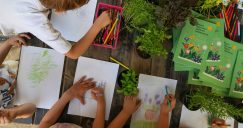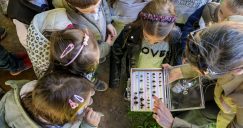Project-based learning for climate justice
Knowledge Creation Phases

- Article, Educational resource, Research
The following is a (non-exhaustive) list of suggested activities for a KCT, which may be used in combination over multiple sessions with the participatory methods outlined.
Engage Phase
- Values sharing exercise for participants to share experience, emotions and hopes for the community they represent. Example activity: invite participants to fill out persona outlines, representing themselves and/or the people they work with: what they think (head), what they feel (heart), what they do now (hands). How might these change through participation in climate action projects? [Suggested time: 1 hour]
- LEVERS partners share key overarching principles from this document: e.g. systems thinking, the Seven Insights, critical pedagogy & social justice, place-based learning, asset-based community development, doughnut economics, etc. HOW: Short presentation & short activity/inspiring story for each section, interactive workshop considering how these principles are/are not already happening in local area [Suggested time: 1-2 hours]
- Knowledge & skills share: researcher/scientist presentations on climate + environmental topic; followed by lightning talks from all participants on their work / interest in the topic, interactive stakeholder map creation exercise [Suggested time: 1-2 hours]
- Social justice climate issue identification and systems thinking workshop – first pass analysis of relevant community needs & assets, paying particular attention to social justice and inclusion [Suggested time: 1-2 hours]
- Place based and arts-based methods workshop. Engage local artists to lead embodied learning in and from place. [Suggested time: 1-2 hours]
Ideation Phase
Building on the learnings from the above section and facilitated by LEVERS partner, the KCT should use participatory methods and a systemic design approach in combination with the Seven Insights to design and develop content for learning programmes for identified community participants. This should provide learners with context and inspiration, opportunities for critical engagement with social justice climate issues, and any tools or resources they might need to make change in their surroundings. These might include access to scientific researchers or public officials, access to data or public policies, access to arts materials or public spaces. Remember: designs should be relevant, pragmatic, disruptive, agentic.
The following are a series of key questions to apply to the emergent designs:
Critical Pedagogy:
- Key question: Does the learning programme support socio-political awareness, and promote critical thinking and dialogue?
- Key Question: are learners & educators engaged in a process of reflection on the (in)justice dimension of climate change? Is there a subsequent follow through on a commitment to action?
Expansive Learning & Transformative Agency:
- Key question: Do learners & educators work collaboratively to interrogate historical and present-day activity systems?
- Key question: Do individuals (learners/educators) have the capacity to contribute to and lead meaningful and transformative changes?
- Key question: Does the learning programme embrace social action and agency based in political imagination, vision, and commitment to social transformation?
Critical eco-pedagogy
- Key question: Do learners have access to appropriate content to make sense of the scientific dimensions of the environmental issues at hand?
- Key question: Do learners have the opportunity for critical thinking about the interconnectedness of humans as part of the natural world, and our relationships with humans and non-human entities? What methodologies might you use to offer learners these opportunities?
- Key question: Do learners have the opportunity to use systems thinking to explore the root causes of selected environmental injustices? What methodologies might you use to offer learners these opportunities?
- Key question: Do learners have the opportunity to analyse the environmental impact of human actions? What methodologies might you use to offer learners these opportunities? How might you assess any increased sense of responsibility and ethical stewardship among learners?
Social justice science pedagogy
- Key question: How might educators better understand the interests, identities and everyday experiences of learners, and work to incorporate them into LEVERS projects?
- Key question: How might LEVERS projects allow learners to merge scientific and other forms of knowledge and practice? How can rigorous science learning be maintained? Can learners take what they learn through classroom-based, curriculum aligned science education, and apply it within a LEVERS project? [Note this may be skills and practices of science, rather than concepts – e.g. collecting data, making observations, undertaking research]
Rightful Presence
- Key question: Does the LEVERS project create some spaces in which learners have 68 autonomy to direct their own exploration of the climate crisis and to create responses which draw on their existing identities, cultural experiences and relationship with science? Can educators facilitate rather than direct this type of learning? [Note, this may be easier to facilitate in a community or out-of-school setting than within a formal education setting.]
Transdisciplinarity, Imagination & Possibility
- Key question: Have you created space for transdisciplinarity, imagination & possibility in your Learning Venture or Knowledge Creation team? If not, how might you do that? Could you invite artists or Indigenous practitioners to lead a session?
- Key question: Does the LEVERS project you are developing offer opportunities for multiple disciplinary investigations of climate justice?
- Key question: How might educators and schools organise participation in a LEVERS project that allows for transdisciplinary approaches?
- Key question: Does the project and the overall approach work with positive emotions and push for collective optimism?
Place-based education
- Key question: How do learners encounter place in their LEVERS project? Are there opportunities for them to see or encounter their place differently?
Open Schooling
- Key question: what features of Open Schooling are present in your learning designs? Are there opportunities for students to learn from one another, their families, wider communities and relevant stakeholders? Are there opportunities for students to learn outside of the classroom and to share their expertise beyond the school walls?
- Key question: is Open Schooling embraced as a pathway for whole-school approaches to climate action? If yes, how might this be shared beyond your Learning Venture to influence educational policy and practice related to climate change education?
Learning Ecosystem
- Key question: How are learning pathways and linked learning opportunities communicated to learners within your learning ecosystem?
- Key question: How can interested individuals and organisations beyond your initial learning ecosystem become part of your local network, and contribute their expertise to support local learning and development? Can you create opportunities to grow your learning ecosystem?
Action Phase
Learning designs created by the Learning Ventures and their extended collaborators should be applied in the selected learning environments. An important feature of the overall LEVERS project design is the coherence and communication between the various sites of learning, promoting a continuum of lifelong learning across a community for climate justice.
The Learning Venture can work with the Seven Insights by sharing positive stories of climate action, and demonstrating ways that different organisations and institutions in a geographical region can cooperate to tackle issues of climate justice in their locality. They may do this by organising public events, arranging exchange visits between schools and other participating organisations, sharing stories and content using traditional or digital media, and showcasing LEVERS projects in talks, presentations and conferences.
Impact evaluation will be carried out in each Learning Venture location as part of the overall LEVERS project, while assessment of student or participant learning in each location should be developed and undertaken locally. Research data will not be collected from learners, but educators and other stakeholders will be contributors to the overall evaluation process. Educators in each setting should take the lead on curricular alignment and designing relevant and rigorous assessment of the learning interventions – this will be more relevant for educators in formal settings but those in community and informal learning settings should also aim to develop approaches to capture participants’ learning.
The features of the LEVERS Learning Framework (Figure 6.7) can be used as a basis for assessment design, along with relevant curricular frameworks. It is suggested that educators plan for a range of assessment to capture different types of learning, multiple assessments over time to capture snapshots of the learning journey, and assessments across levels of complexity to identify student progress. Assessments should explore students’ ability to know and understand concepts, and to relate and transfer ideas to new contexts to solve problems.
As community-level projects start out in each location, they will be experimental and exploratory, and learner assessments should be used the alongside overall project evaluation to examine the features of the learning intervention design, and the effectiveness of its implementation in each setting. Ideally, the timing of the Learning Venture projects should leave time for at least two iterations of each intervention, so that an iterative design-based research model can be applied, with evaluation of the first iteration informing changes and improvements for the second.
Evaluation dimensions include:
- Application of the Seven Insights for Climate Action
- Application of systemic design
- Transdisciplinarity
- Diversity, equity, accessibility, inclusion and belonging
- Relationships within the Learning Venture, KCT and wider learning ecosystem
- Collaboration and coherence of climate action projects across the learning ecosystem
- Knowledge creation and project-based learning approaches
- Logistical and operational aspects of the overall project
- Impact on local stakeholders
- Transferable learning
The evaluation research in LEVERS is led by partner TCD and the findings, due to be published in 2026, will provide an insight into the distributed, learning ecosystem approach to education and lifelong learning for climate justice in nine European locations, and will support policy recommendations related to (science) education and climate action. The foundational units (Chapters 2-5) and applied unit (Chapter 6) of this document will be adapted into webinars and online trainings for educators, due to be launched in 2025.









